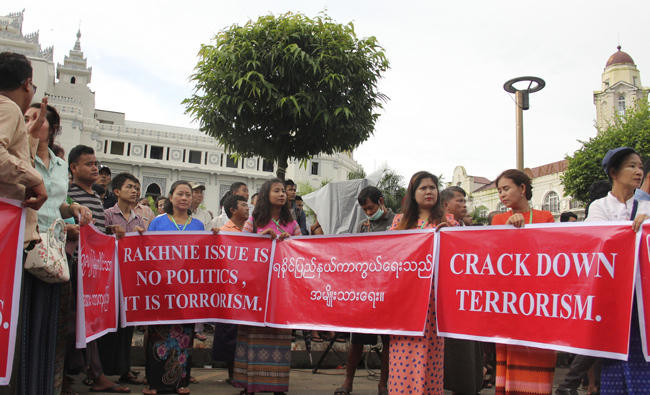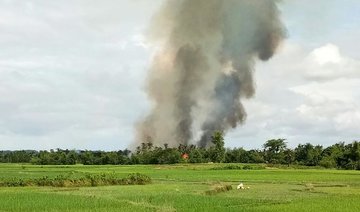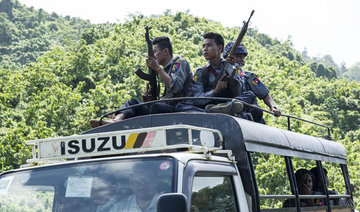BANGKOK: Several hundred Buddhist nationalists, including monks, rallied in Myanmar’s largest city on Wednesday to urge stronger action against insurgents from the Muslim Rohingya minority for attacks on police last week.
The attacks in Rakhine state in western Myanmar have spiraled into chaotic violence, with more than 100 dead and villages torched.
At least 18,000 Rohingya have fled the violence and crossed into Bangladesh in less than a week, with hundreds stranded in a no man’s land at the countries’ border, the International Organization for Migration said Wednesday.
The army, responding to last Thursday’s attacks, launched what it called clearance operations against the insurgents, but advocates for the Rohingya say they are attacking and burning Rohingya villages, shooting civilians and causing others to flee.
The government blames Rohingya insurgents and their sympathizers for the continuing violence. Government figures put the death toll since last week at a minimum of 103, including 12 members of security forces, 77 people described as insurgents and 14 civilians. There were reports of additional deaths Wednesday.
Rohingya advocates fear the death toll for civilians is much higher.
Most of Myanmar’s estimated 1 million Rohingya live in northern Rakhine state. They face severe persecution in the Buddhist-majority country, which refuses to recognize them as a legitimate native ethnic minority, leaving them without citizenship and basic rights.
Longstanding tension between the Rohingya Muslims and ethnic Rakhine Buddhists erupted in bloody rioting in 2012. That set off a surge of anti-Muslim feeling throughout the country.
Wirathu, a Buddhist monk and leader of the anti-Muslim movement who is known for virulent sermons, told Wednesday’s protesters in Yangon that only the military can control the situation in northern Rakhine.
He criticized the civilian government of Aung San Suu Kyi for not responding quickly to the army’s call Tuesday for a meeting of the National Security and Defense Council, which could declare a state of emergency in Rakhine and give the military absolute authority to enforce it. The military holds a majority on the council, which was created by the 2008 military-drafted constitution.
“Only the military’s commander in chief can protect the lives and the properties of the people,” Wirathu said. “The military is the only one that can give a lesson to tame the Bengali terrorists.” Myanmar nationalists use the term Bengali for Rohingya because of a belief they migrated illegally from Bangladesh, even though many families have been in Myanmar for generations.
Wirathu also denounced international aid groups that the government has accused, without evidence, of giving assistance to the Rohingya insurgents. The allegations have circulated widely on social media.
The Information Ministry said Wednesday that 45 homemade bombs were detonated and seven villages, one security post and two neighborhoods in the township of Maungdaw were burned down on Sunday and Monday.
Maungdaw, in the northern part of Rakhine state, is a center of the violence, though villages over a much wider area were also hit.
Sanjukta Sahany, a spokeswoman for the International Organization for Migration in Cox’s Bazar, Bangladesh, on the border with Myanmar, said the Rohingya crisis was not just an issue between Myanmar and Bangladesh but of international concern.
Ali Hossain, Cox’s Bazar district’s top government official, told The Associated Press that its resources were under huge stress after some 87,000 Rohingya entered Bangladesh since October last year and another 18,000 since last Friday.
The UN refugee organization on Tuesday urged Bangladesh to continue to allow Rohingya fleeing violence to seek safety. It said it was ready to help Bangladesh with assistance for the refugees.
Bangladesh Prime Minister Sheikh Hasina asked the United States on Wednesday to pressure Myanmar so its government would stop pushing Rohingya toward Bangladesh, her spokesman said.
Hasina made the request during talks with Alice Wells, US acting assistant secretary of state for South and Central Asia, said Ihsanul Karim, Hasina’s press secretary.
The insurgent raids last Thursday were deadlier than an attack by the militants on three border posts last October that killed nine policemen and set off months of brutal counterinsurgency operations against Rohingya communities. Human rights groups accused the army of carrying out massive abuses, including killing, rape and burning down more than 1,000 homes and other buildings.
Myanmar Buddhists seek tougher action against Rohingya
Myanmar Buddhists seek tougher action against Rohingya

EU and Indonesia announce ‘political agreement’ on trade deal

- European bloc and Southeast Asia’s largest economy have been negotiating since 2016 to agree a deal that is expected to increase trade and investment
BRUSSELS: EU chief Ursula von der Leyen and Indonesian President Prabowo Subianto on Sunday announced a “political agreement” to conclude a long-awaited free trade deal, as US leader Donald Trump upends global commerce.
“We’re living in turbulent times and when economic uncertainty meets geopolitical volatility, partners like us must come closer together. So today we’re taking a big step forward in this partnership,” von der Leyen told journalists in Brussels.
“I am very pleased to report that we have just reached a political agreement on an ambitious Free Trade Agreement.”
The 27-nation European bloc and Southeast Asia’s largest economy have been negotiating since 2016 to agree a deal that is expected to increase trade and investment.
A European Commission statement called Sunday’s agreement a “decisive milestone” toward striking the deal — which is to be concluded in September by EU trade chief Maros Sefcovic and Indonesia’s chief economic minister Airlangga Hartarto.
“There’s a lot of untapped potential in our trade relationship. And therefore this agreement comes at the right time, because the new agreement will open new markets,” von der Leyen said.
“It will create more opportunities in key industries, in business activity and agriculture, in automotive and in services.”
Brussels has stepped up efforts to improve ties with key potential partners around the world as Trump threatens a trade war with sweeping tariffs.
“This big and important political agreement on the free trade agreement with Indonesia is today a huge milestone forward, and shows that we’re looking for new markets, open markets,” von der Leyen said.
Prabowo called the announcement in Brussels a “breakthrough.”
“After 10 years of negotiations, we have concluded the agreement to have a Comprehensive Economic Partnership Agreement, which basically is a free trade agreement,” he said.
The president said “we consider Europe still a very important factor, and we would like to see a very strong Europe.”
But he insisted that “the United States will be always a very important leader in the world.”
The European Union is Indonesia’s fifth-largest trading partner with bilateral trade between them reaching $30.1 billion last year.
Ties had been frayed by a proposed EU import ban on products linked to deforestation that has angered Indonesia because it is a major palm oil exporter.
That legislation has been delayed to the end of this year.
Pakistan minister to attend tomorrow tri-nation conference in Tehran on pilgrim, border issues

- The Pakistan-Iran-Iraq conference is being convened on Islamabad’s request
- Thousands of Pakistanis travel to the two countries annually to visit holy sites
KARACHI: Pakistan’s Interior Minister Mohsin Naqvi is undertaking an official visit to Tehran to attend a tri-nation conference on pilgrim and border issues, the Pakistani interior ministry said on Sunday.
The conference of interior ministers from Pakistan, Iran and Iraq is being convened on a request from Islamabad, according to the Pakistani interior ministry.
Thousands of Pakistani Shiite Muslims, who travel annually to Iran and Iraq to visit holy sites, have often complained of issues at the border.
“Interior Minister Mohsin Naqvi will attend the trilateral conference on pilgrims and border issues in Tehran tomorrow,” the Pakistani interior ministry said on Sunday. “Naqvi will also meet with Iranian President Masoud Pezeshkian.”
Last month, Pakistan evacuated over 260 nationals from Iraq and another 450 Pakistanis who had been stranded in Iran during the Tehran-Israeli conflict.
The 12-day war between Iran and Israel, which began on June 13 Israeli airstrikes on Iranian nuclear facilities and military leadership, raised alarms in a region that was already on edge since the start of Israel’s war on Gaza in October 2023.
Pakistan remained engaged in talks with regional partners like Saudi Arabia, Iran, China and Qatar to de-escalate tensions in the Middle East after Iran conducted retaliatory strikes on Israel and a US base in Qatar, raising fears the conflict could draw in other regional states.
Kuwaiti emir to attend Bastille Day, meet Macron during first official visit to France

- Kuwaiti-French relations commited to improving cooperation and supporting regional and global stability
- France was one of the first countries to support Kuwait’s independence in 1961
LONDON: Kuwaiti Emir Sheikh Meshal Al-Ahmad Al-Jaber Al-Sabah made his first official visit to France on Sunday since assuming power in December 2023.
The visit reflects the historical partnership between Paris and Kuwait, the Presidential Palace, the Elysee, said in a statement.
Sheikh Meshal will attend the official military parade to celebrate France’s national Bastille Day on July 14, alongside a meeting with French President Emmanuel Macron.
The two parties aim to strengthen ties by enhancing partnerships in sectors such as diplomacy, defense, economy, education, health, culture, and scientific research, the Kuwait Agency reported.
France was one of the first countries to support Kuwait’s independence in 1961 and played a significant role in 1991 in its liberation from Iraqi forces led by Saddam Hussein, the Elysee said.
Trade between Kuwait and France was worth €2.8 billion ($3.27 billion) in 2023, with French infrastructure, energy, and construction companies leading projects in Kuwait. More than 1,000 students benefited from the educational programs offered by the French Institute, while French healthcare institutions, such as the Gustave Roussy Institute, contributed to supporting the Kuwaiti healthcare sector through consultations and projects.
Kuwaiti-French relations display a strong partnership, with a commitment to improving cooperation and supporting regional and global stability, the Elysee added.
Minister of Defense Sheikh Abdullah Ali Al-Sabah, Foreign Minister Abdullah Al-Yahya, the chief of the Kuwait Direct Investment Promotion Authority and other high officials are accompanying the emir of Kuwait.
Most Gulf stocks subdued as Trump steps up tariff threats

- Saudi Arabia’s benchmark index fell 0.2%
- Qatar’s benchmark index finished flat in a calm session
DUBAI: Gulf equities ended mixed on Sunday, with stocks drifting in a tight range during a quiet trading session as investors sought clarity after US President Donald Trump escalated his global trade war.
Trump threatened on Saturday to impose a 30 percent tariff on imports from Mexico and the European Union, following the announcement of a 35 percent duty on Canadian imports, both starting Aug. 1.
He also proposed a blanket tariff rate of 15 percent-20 percent on other countries, an increase from the current 10 percent baseline rate.
Saudi Arabia’s benchmark index fell 0.2 percent, as mixed sector performance kept the market subdued ahead of key earnings.
Utilities heavyweight ACWA Power declined 2.4 percent as its rights issue offering ended.
Qatar’s benchmark index finished flat in a calm session, with telecom giant Vodafone Qatar gaining 1.2 percent.
Investors remained cautious as the US Federal Reserve is widely expected to keep interest rates unchanged as it waits to see the impact of tariffs on price pressures.
With Gulf currencies pegged to the US dollar, the Fed’s decisions on interest rates impact the region’s monetary policy.
Outside the Gulf, Egypt’s blue-chip index dropped 0.8 percent, hit by a 1 percent fall in Commercial International Bank.
Egypt’s central bank kept key interest rates unchanged on Thursday, pausing a trend of rate reductions despite inflation rates easing.
Syria signs $800m agreement with DP World to bolster ports infrastructure

- Deal focuses on developing multi-purpose terminal at Tartous
DUBAI: Syria’s General Authority for Land and Sea Ports on Sunday signed a $800 million agreement with UAE’s DP World to bolster Syrian ports infrastructure and logistical services, Syrian state news agency SANA reported.
The agreement follows on from a memorandum of understanding signed between the two sides in May.
The deal with DP World, a subsidiary of UAE investment company Dubai World, focuses on developing a multi-purpose terminal at Tartous on Syria’s Mediterranean coast and cooperation in setting up industrial and free trade zones.
The signing ceremony was attended by Syrian President Ahmed Al-Sharaa.
Last month, US President Donald Trump signed an executive order terminating a US sanctions program on Syria, paving the way for an end to the country’s isolation from the international financial system and for the rebuilding of its economy shattered by the civil war.
The removal of US sanctions will also clear the way for greater engagement by humanitarian organizations working in Syria, easing foreign investment and trade as the country rebuilds.




















